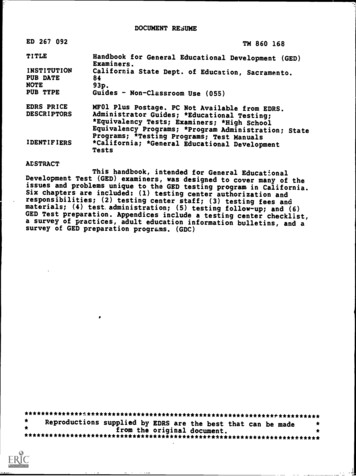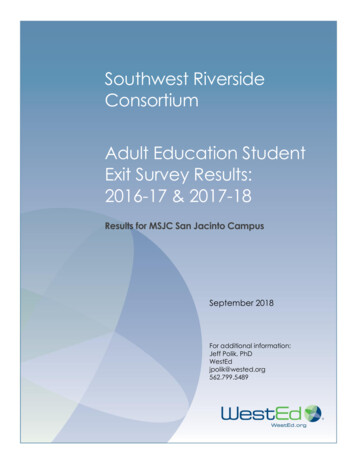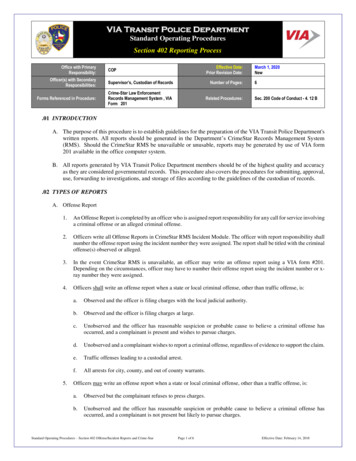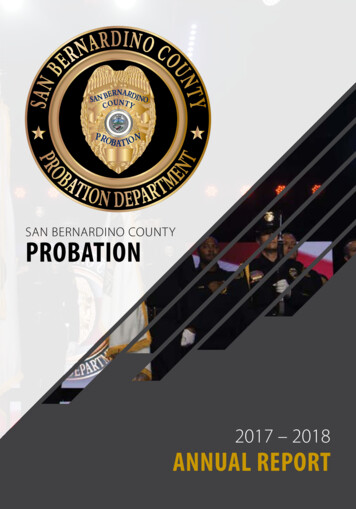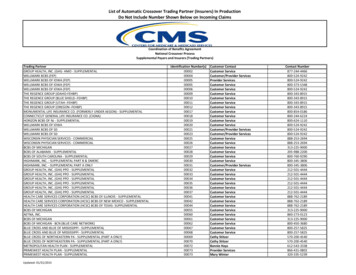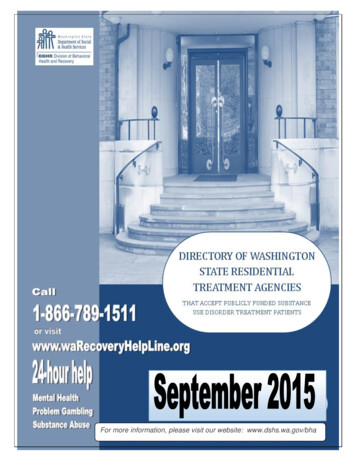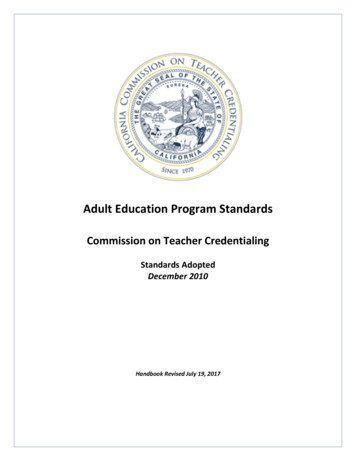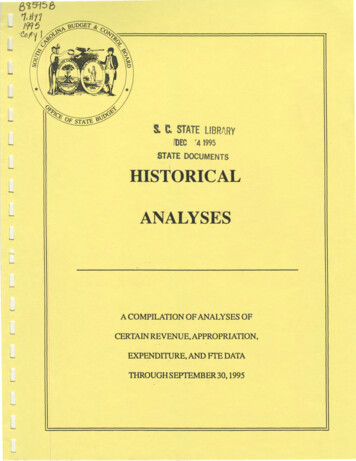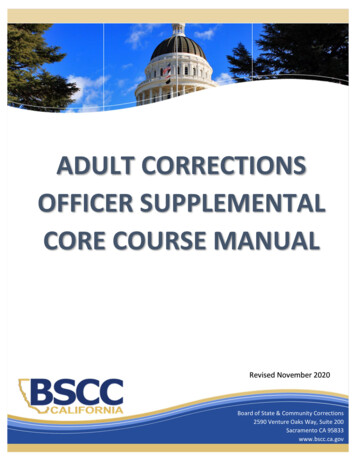
Transcription
ADULT CORRECTIONSOFFICER SUPPLEMENTALCORE COURSE MANUALRevised November 2020Adult Corrections Officer Supplemental Core CourseJuly 2020Board of State & Community Corrections2590 Venture Oaks Way, Suite 200Sacramento CA 95833www.bscc.ca.gov
Adult Corrections Officer Supplemental Core CourseJuly 2020
ACKNOWLEDGEMENTSUnder the direction of an Executive Steering Committee (ESC), 17 workgroups of subject-matter experts(SMEs) met to review and make recommendations for changes to the core training program. Theworkgroups included more than 200 entry-level, supervisor, manager and administrators from 53 ofCalifornia’s 58 counties. They were representative of the diversity of the State in location, size, andprocesses of correctional agencies and included: 82 participants from Sheriff’s Departments,137 participants from Probation Departments for both juvenile and adult,3 participants from Police Departments that operate a jail, and8 participants from private training providers (includes CA Community Colleges).Specialized SME workgroups included: 22 behavioral health SMEs included clinicians, line staff and supervisors working with offenderswith mental health concerns, other state and local agencies currently providing mental healthtraining (California Highway Patrol, California Department of Corrections and Rehabilitation, LosAngeles Police Department and DHS) and providers of mental health services, and23 defensive tactics instructors from agency and private core providers.The Board of State and Community Corrections (BSCC) is extremely grateful to all those whovolunteered their time and hard work in making this revision process successful. Their support andassistance, along with their agencies’ generous contribution of their time, enables California to maintaina comprehensive and current training program for entry level corrections and probation officers.Specifically, the BSCC wishes to thank the Local Selection and Training Standards (LSATS) ESC memberslisted below:Michael Ertola, ESC ChairChief, Nevada County ProbationDarren ThompsonSheriff, San Benito County SheriffJohn KeeneChief, San Mateo County ProbationKory HoneaSheriff, Butte County SheriffBrian J. RichartChief, El Dorado County ProbationLisa RosalesChief, Glendora Police DepartmentDalia Alcantara and Walter MannLos Angeles County ProbationJaymie ClaytonJail Manager, Imperial County SheriffStacy LopezOffice of Peace Officer SelectionAnd Training, CDCRMatt CervantesSenior Program Officer, Sierra HealthFoundationJeffrey SloanAttorney, Workplace LegalJohn DodsonManaging Consultant, Sutter HealthMesha ElliottTraining Manager, Kern ProbationCharisse ArnoldDirector, Public Safety Center, Santa Rosa Jr.CollegeAdult Corrections Officer Supplemental Core CourseJuly 2020
Adult Corrections Officer Supplemental Core CourseJuly 2020
TABLE OF CONTENTSINTRODUCTION .1ADULT CORRECTIONS OFFICER JOB DESCRIPTION .2BACKGROUND AND AUTHORITY .3CORE TRAINING OVERVIEW.4ASSUMPTIONS GUIDING DEVELOPMENT OF THE ACO CORE COURSE .6SUMMARY OF CHANGES TO THE ACO CORE COURSE.7GENERAL INFORMATION ON CORE COURSE CONTENT AND FORMAT .9AGENCY SPECIFIC TRAINING (OPTIONAL) . 11TESTING PERFORMANCE OBJECTIVES . 12CORE TRAINING COURSE OUTLINE AND TOPIC SCHEDULE . 15TOPIC #1.0: CALIFORNIA CRIMINAL JUSTICE SYSTEM . 19CLASS #1.1:TITLE 15 . 19CLASS #1.2:LEGAL FOUNDATIONS AND LIABILITY & CONFIDENTIALITY AND RECORDS . 19TOPIC #2.0: PROFESSIONALISM AND ETHICS . 20CLASS #2.1:SOCIAL MEDIA . 20TOPIC #3.0: GANGS . 21CLASS #3.1:GANG OVERVIEW AND GANG SUPERVISION . 21TOPIC #4.0: COMMUNICATION . 22CLASS #4.1:INTERPERSONAL COMMUNICATION AND EFFECTIVE COMMUNICATION . 22TOPIC #5.0: MAINTAINING SECURITY . 23CLASS #5.1:SECURITY AND KEY CONTROL . 23CLASS #5.2:COUNTS . 23CLASS #5.3:FACILITY SEARCHES . 24CLASS #5.4:CONTRABAND AND EVIDENCE . 24TOPIC #6.0: BOOKING, RECEIVING AND RELEASING . 25CLASS #6.1:BOOKING AND INTAKE & BOOKING PROCEDURES . 25CLASS #6.2:ORIENTATION, CLOTHING AND SUPPLIES . 26CLASS #6.3:RELEASING OFFENDERS . 26Adult Corrections Officer Supplemental Core CourseJuly 2020
TOPIC #7.0: SUPERVISING OFFENDERS . 27CLASS #7.1:MANIPULATION OF STAFF . 27CLASS #7.2:DISTURBANCES AND DISPUTES . 27CLASS #7.3:SAFETY/HEALTH STANDARDS AND PROCEDURES. 28CLASS #7.4:RECREATION . 28CLASS #7.5:CLEANING OF CELLS . 28CLASS #7.6:PROGRESSIVE DISCIPLINE AND OFFENDER GRIEVANCES. 28CLASS #7.7:GROUP DYNAMICS . 29CLASS #7.8:MOVEMENT . 29CLASS #7.9:OFFENDER WORKERS . 29TOPIC #8.0: MEDICAL . 30CLASS #8.1:MEDICAL ISSUES AND UNIVERSAL PRECAUTIONS . 30CLASS #8.2:MEDICAL LEGAL ISSUES . 30TOPIC #9.0: CLASSIFICATION OF OFFENDERS . 31CLASS #9.1:CLASSIFICATION OF OFFENDERS . 31TOPIC #10.0: CULTURAL AWARENESS . 32CLASS #10.1:GENDER IDENTITY . 32TOPIC #11.0: REPORT WRITING AND RECORD KEEPING . 33CLASS #11.1:GENERAL REPORTS . 33TOPIC #12.0: EMERGENCY PROCEDURES . 34CLASS #12.1:EMERGENCY PLANNING . 34CLASS #12.2:FIRE AND LIFE SAFETY* . 34TOPIC #13.0: VISITATION . 35CLASS #13.1:VISITATION . 35TOPIC #14.0 SCREENING AND DISTRIBUTION OF SUPPLIES AND MAIL . 36CLASS #14.1:SCREENING AND DISTRIBUTION OF SUPPLIES AND MAIL . 36TOPIC #15.0: TRANSPORTATION . 37CLASS #15.1:PREPARATION FOR TRANSPORT . 37TOPIC #16.0: PROGRAMS . 38CLASS #16.1:EVIDENCE BASED PRACTICES AND PROGRAMS . 38TOPIC #17.0: ASSAULT AND ABUSE . 39CLASS #17.1:SEXUAL ASSAULT AND ABUSE* . 39Adult Corrections Officer Supplemental Core CourseJuly 2020
TOPIC #18.0: DEFENSIVE TACTICS AND RESTRAINT TECHNIQUES . 40CLASS #18.1:PERSON SEARCHES . 40CLASS #18.2:USE OF RESTRAINTS . 40CLASS #18.3:CELL EXTRACTIONS . 40TOPIC #19.0: BEHAVIORAL HEALTH . 41CLASS #19.1:SIGNS AND SYMPTOMS OF SUBSTANCE ABUSE . 41CLASS #19.2:TRAUMA . 41CLASS #19.3:INTERVENTIONS AND RESOURCES . 42CLASS #19.4:ROLES AND RESPONSIBILITIES. 42CLASS #19.5:LIABILITY . 43CLASS #19.6:SUICIDE PREVENTION. 43CLASS #19.7:FOUNDATION AND DEFINITIONS: SIGNS AND SYMPTOMS . 43CLASS #19.8:SAFETY . 44CLASS #19.9:EMOTIONAL SURVIVAL . 44ATTACHMENTS . 46ATTACHMENT 1: LESSON PLAN POLICY (REVISED JULY 1, 2019) . 46ATTACHMENT 2: TEST ADMINISTRATION POLICY (EFFECTIVE JULY 1, 2013) . 48Adult Corrections Officer Supplemental Core CourseJuly 2020
Adult Corrections Officer Supplemental Core CourseJuly 2020
INTRODUCTIONThe Adult Corrections Officer Supplemental Core Course (Supplemental to the Peace Officer Standardsand Training (POST) Basic Academy) is designed for the adult corrections peace officer who:1.2.3.4.Has successfully completed the POST Basic Academy Course for law enforcement officers;Completes this course after the POST Basic Academy;Is employed primarily as a peace officer as defined in Penal Code Section 830.1; and,Has been assigned by the administrator of a local corrections agency to perform the jobresponsibilities of an adult corrections officer.This course consists of a minimum of 79 hours of instruction in specific instructional objectives.Purpose and Scope of This ManualThe primary purpose of this Core Training Manual is to present the core training standards for AdultCorrections officers (ACO). These standards include the required training classes, performanceobjectives, instructional hours, and testing requirements for training that is required to be completedwithin one year of hire (core training). The information in this manual is designed for core trainingproviders to provide an overview of the content of the entry-level core course. For more in-depthcoverage of the core course certification and delivery requirements, training providers are encouragedto thoroughly read the STC Policy and Procedure Manual for Presenting Local Corrections Core Courses.This Supplemental ACO core training manual is divided into several sections. A summary description of the ACO job as it is widely performed across the State and providesinformation about how core training is linked to the requirements of the job.BSCC’s role in standard development and authority to set training standards for local correctionsagencies.An overview of the core training program and how it was developedThe overarching principles that were used to guide the development of the core trainingstandards.A summary of changes made to the curriculum in this revision of the core training standards.General information about the core training program.Information about adding optional agency specific training (Topic 20.0) to a core training course.Information about testing performance objectivesAn outline of the testing requirements for each class.An outline of the content of the core course including the topics, classes, how muchinstructional time required for each.General information and format, prerequisites and the prescribed objectives for the course.These objectives are the fundamental building blocks of the curriculum. They provide the goalstoward which trainees will strive and the basis for developing methods to evaluate performanceeffectiveness.Adult Corrections Officer Supplemental Core CourseJuly 20201
Effective Date of This ManualThe training standards presented in this manual are effective July 1, 2020 and remain in effect untilreplaced. STC periodically reviews and updates the standards. Minor revisions will be noted in thismanual with a revision date on the front cover and footnote. Major revisions will be accomplished byretiring and replacing this manual.ADULT CORRECTIONS OFFICER JOB DESCRIPTIONThe ACO job can differ from one county or city to another and from one assignment to another in thesame jurisdiction. This core training course relates to the activities or tasks performed by most adultcorrections officers throughout the state, regardless of the location, size, budget, etc. of the employingagency. The ACO job can differ from one county or city to another and from one assignment to anotherin the same jurisdiction. This core training course relates to the activities or tasks performed by mostadult corrections officers throughout the state, regardless of the location, size, budget, etc. of theemploying agency. Generally speaking, the ACO ensures that adults in county custody are provided witha safe and humane environment. The ACO is responsible for the custody, supervision, treatment andrehabilitation of those adults. In some counties, the ACO is a peace officer and exercises peace officerduties.This job description comes from two sources. First, the overall mission of the ACO job and its place inthe California Criminal Justice System are established in state law. The second and primary source ofinformation about the job comes from the statewide job analysis research conducted periodically by theSTC Program of the BSCC.Adult Corrections Officer Supplemental Core CourseJuly 20202
BACKGROUND AND AUTHORITYThe BSCC was established on July 1, 2012, and was formerly known as the Corrections StandardsAuthority (CSA), and prior to 2005, as the Board of Corrections (BOC) which was created in 1944 toprovide leadership and coordination for local corrections agencies. Among other duties, the BSCC setsminimum standards for the selection and training requirements for local corrections personnelemployed by Sheriff’s Offices, Probation Departments, and Police Departments, including the coretraining standards presented in this manual. These responsibilities are defined in California Penal CodeSections 6024 through 6037 and carried out by the STC Division of the BSCC.About the Standards and Training for Corrections ProgramThe STC program was established in 1980 to establish a statewide standard to raise the level ofcompetence of the state’s local corrections and adult corrections personnel. The program accomplishesthis by developing selection and training standards, providing a statewide course certification anddelivery system, conducting compliance reviews, and providing technical assistance, training andfunding to local corrections agencies.The STC program assists local corrections agencies in ensuring they select qualified personnel and trainthem to a statewide standard to support proficient job performance. STC establishes legally defensiblejob-related skills training standards and selection criteria that helps protect agencies from failure totraining and fair employment challenges. Job relatedness is provided through a thorough job analysisand assessment process that demonstrates the relationship between the standard (course subjectmatter or employment screening tool) and the job being performed.Local corrections agencies participate in the STC program voluntarily. Through their participation,agencies receive access to the statewide standards, the certification and course delivery system, andtraining and technical assistance provided through the STC program and agree to follow all programregulations, policies and procedures. Local corrections agencies also receive funding to help offset thecosts of complying with the state standards.AuthorityThe STC program is authorized in Penal Code Section 6035 and 6036. Supporting regulations are foundin Title 15, Division 1, Subchapter 1, Articles 1 - 9, Sections 100-358 of the California Code of Regulations(CCR).Adult Corrections Officer Supplemental Core CourseJuly 20203
CORE TRAINING OVERVIEWCalifornia Code of Regulations Sections 169-185 requires everyone hired into an entry-level correctionsposition to complete a core course of training, prescribed by STC, within one year of hire, assignment, orpromotion. This includes: Adult Corrections Officer (ACO)– responsible for the supervision and custody of adults detainedin an adult facilityJuvenile Corrections Officer (JCO)– responsible for the supervision and custody of youthdetained in a juvenile facilityProbation Officer (PO)– responsible for the supervision of youths and adults on probationSupervisor – responsible for supervising staff within a facility or probation functionManager/Administer – above first line supervisor and responsible for managing a facility orprobation functionWhat Is and Is Not Included in Core TrainingCore training is the entry-level or basic training provided within the first year of employment to anyemployee hired into any of the entry-level corrections positions listed above. Core training is based onthe tasks that each employee in the respective entry-level position must perform. Core tasks areidentified through job analysis research conducted by STC. These analyses are periodically updated dueto the evolving nature of the local corrections professions. Each core course has specific content and aminimum number of instructional hours. The core courses for ACO, JCO and PO also include prescribedclasses, performance objectives, training notes and testing requirements to measure learning.Core training does not fulfill all the training requirements for an entry-level employee. Many employeesare also required to complete training mandated by the Commission on Peace Officer Standards andTraining (POST) such as PC 832 training. Additionally, counties may have local training requirementsthat are not met through core training. It is the responsibility of each hiring agency to identify and fulfillthe training requirements for their employees.When Is Core Training RequiredAlthough core training can be completed within one year of hire, it is designed as a pre-assignmentmodel and assumes that the students have no prior training or work experience. The training needs ofexperienced employees are not covered by the core course. BSCC strongly encourages agencies todeliver core training to students immediately upon hire and prior to performing the duties of the job.Who Can Delivery Core TrainingMost core courses are delivered by corrections agencies to corrections employees. However, a smallnumber of core courses are delivered by community colleges or private training providers and caninclude students who are not hired to one of the positions listed above but are enhancing their skills tobecome employed at a local corrections agency. All core courses must be certified by STC. Informationabout the certification process can be found in the STC publication Policy and Procedure Manual forPresenting Local Corrections Core Courses.Adult Corrections Officer Supplemental Core CourseJuly 20204
Job Relatedness and Defensibility of Core TrainingThe major tasks and responsibilities of the ACO job in the State of California are defined by acomprehensive and statewide job analysis completed by the BSCC in 2015. The primary data gatheringinstrument in the job analysis was a structured task questionnaire completed by nearly 5,000 adultcorrections officer job incumbents and supervisors. The questionnaire identified the tasks that areperformed by adult corrections officers, the frequency that each task is performed, and how importanteach task is to successful job performance. The ratings from these questionnaires were used to identifythe core tasks upon which this curriculum is built and provides the legally defensible link betweentraining and job requirements. The 2015 job analysis report can be found on the STC web page.There are a great many tasks performed by local corrections professionals around the state. To beincluded on the list of core tasks, a task must meet the statistical criteria for frequency of performance,importance, and statewide application. After the core tasks were identified, incumbents andsupervisors identified the knowledge, skills and abilities (KSA) required to perform each task. The tasksand KSAs are the basis for developing performance objectives that can be directly tied back to jobrequirements. The establishment of the relationship between the required training and jobperformance (job relatedness) provides legal defensibility of the core training requirements.Adult Corrections Officer Supplemental Core CourseJuly 20205
ASSUMPTIONS GUIDING DEVELOPMENT OF THE ACO CORE COURSETraining design involves a series of decisions, many of which are critical to producing an effectiveinstructional program. For example, the designers must repeatedly make decisions regarding theinclusion or exclusion of specific content in the training course. While such decisions are often complexand difficult, they are much more easily made if some basic assumptions or parameters have beenestablished for the project. The assumptions that guided the development of the ACO core course arepresented below.Assumption #1: The content of the training course must be job related.This assumption refers all decisions on training content, methods, and format back to the actualdemands of the adult corrections officer’s job. To the extent that knowledge or skills are not eitherfrequent and/or essential to job performance as identified by job analysis, they are not included in thetraining course.Assumption #2: The training course should specify the training needed by entry-level adult correctionsofficers who have no prior training or experience in corrections.This assumption identifies entry-level ACOs as the target audience for the core training course. Thetraining needs of experienced ACOs are not covered by this course. Because core training can beprovided up to one year after hire, some ACOs attending core may already have some work experience,but that experience can vary widely and is not considered in core training. The assumption of no priortraining or experience ensures that the core training course covers the needs of all entry-levelpersonnel.Assumption #3: The training course should specify only the knowledge and skills that are essential forthe newly hired adult corrections officer to meet minimum performance standards for entry-levelpersonnel and to obtain maximum benefit from subsequent on-the-job training and experience.The core training course should not be expected to produce an experienced ACO capable of handlingevery job assignment. The core training course provides the trainee with the minimum concepts andskills necessary to perform the job and to accelerate later on-the-job learning and training.Assumption #4: Trainees will complete the entire core training course prior to their first actual workassignment.Assumption #4 is derived from Assumptions #2 and #3. Since trainees are assumed to have no priorbackground in adult corrections, the core training course should be completed before trainees beginperforming the complex requirements of the job.Assumption #5: The core training course should be administratively feasible and efficient.This assumption helps ensure that the standards are reasonable and can be implemented withinoperational and administrative constraints (e.g., policies, time, budget, personnel, etc.).Adult Corrections Officer Supplemental Core CourseJuly 20206
SUMMARY OF CHANGES TO THE ACO CORE COURSEIn 2019, the BSCC approved a comprehensive revision to ACO core training. It included reviewing theentire content of core in view of the most recent job analysis and making changes to curriculum toaddress gaps, remove redundancies, and ensure the training met the needs of today’s adult correctionsofficer. Multiple workgroups were convened over an 18-month period to complete the analysis andmake revision recommendations. The workgroups included more than 200 entry-level, supervisor,manager and administrators from 53 of California’s 58 counties. They were representative of thediversity of the State in location, size, and processes of correctional agencies. The revisions include:Increased Core Academy Hours: Supplemental core training was increased by 23 hours. This is a netincrease that reflects the comprehensive review of content that resulted in the removal of some contentand the addition of other content. The new ACO Supplemental core course is 79 hours.Inclusion of Prerequisites – The structured order of core was removed to provide more flexibility toproviders in presenting core courses. Instead, the revised core course includes prerequisites only forclasses that have specific information that must be learned prior to taking another class are prerequisiteclasses. The prerequisite is noted under the title of any class that has one. All other classes can betaught in any order.Expanded Behavioral Health Topic – The training content related to mental and behavior health hasbeen greatly expanded and enhanced. For this topic only, training providers will be provided withcomplete lesson plans, instructor and participant materials, and testing materials. The topic includes thefollowing new classes: TraumaInterventions and ResourcesStigma and BiasLiabilitySafetyEmotional SurvivalNote: All Behavioral Health lesson plans have been developed for the full ACO core. The supplementalcore has been designed using only certain performance objectives out of the Behavioral Healthcurriculum.Providers have the option to deliver only these performance objectives to meet the minimumstandard or to deliver the entire Behavioral Health topic from the full ACO core. If providers decide toteach only these minimum performance objectives, lesson plans must be developed using only theseperformance objectives.Adult Corrections Officer Supplemental Core CourseJuly 20207
Additional new classes and topics – In addition to the expanded Behavioral Health topic, the revisedACO core course includes several new or significantly expanded classes as follows: Social MediaCrisis Communication and
The Adult Corrections Officer Supplemental Core Course (Supplemental to the Peace Officer Standards and Training (POST) Basic Academy) is designed for the adult corrections peace officer who: 1. Has successfully completed the POST Basic Academy Course for law enforcement officers; 2. Completes this course after the POST Basic Academy; 3.


